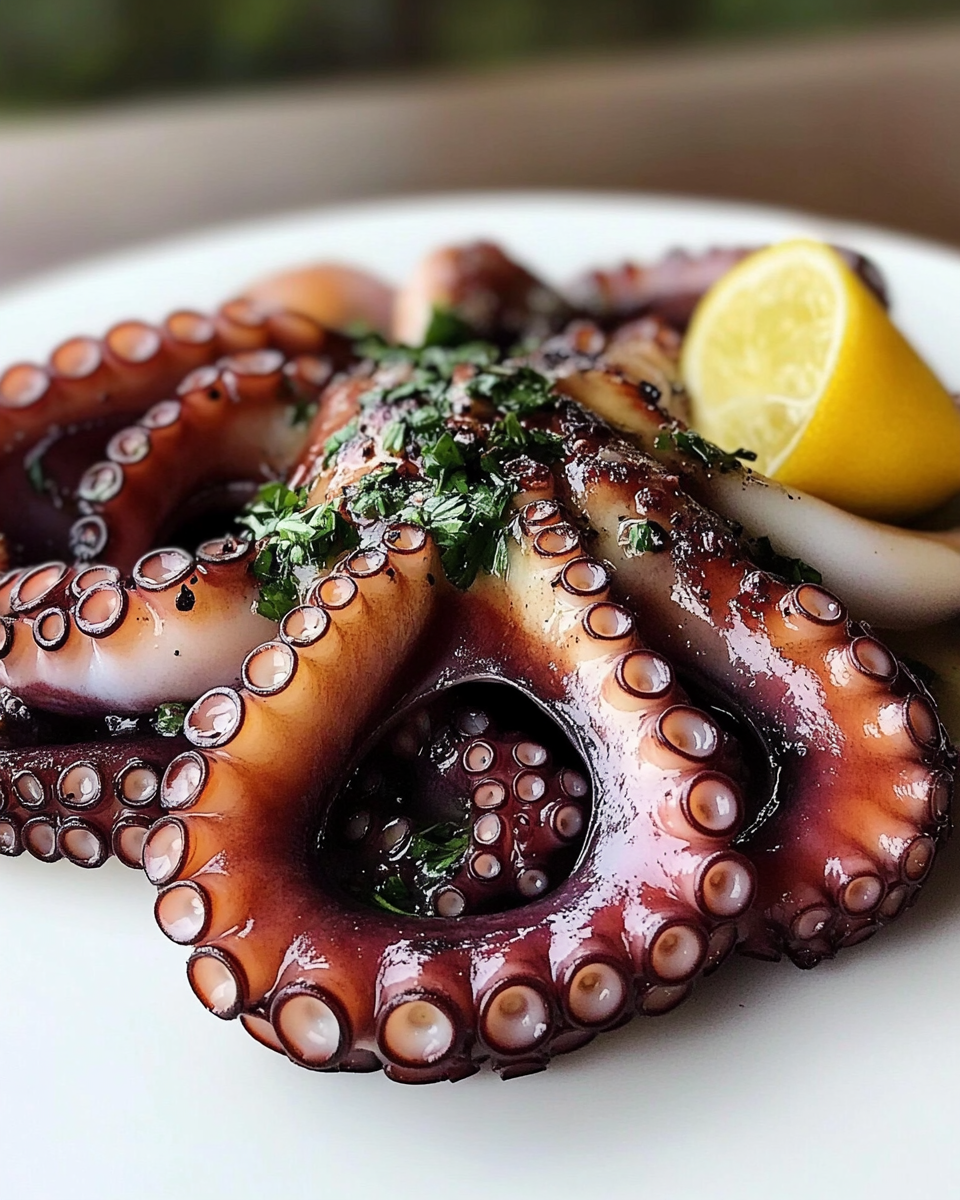Grilled octopus is a globally loved seafood dish known for its tender texture and smoky flavor. A staple in Mediterranean and Asian cuisines for centuries, this dish pairs well with zesty marinades and fresh herbs. Whether you’re hosting a dinner party or experimenting with new flavors, grilled octopus is sure to impress with its bold taste and elegant presentation.
Full Recipe:
Ingredients
For the Octopus:
-
1 whole octopus (2–3 lbs), fresh or frozen
-
Water and kosher salt for boiling
-
2 tbsp olive oil
-
1 clove garlic, minced
-
Juice of 1 lemon
-
Salt and black pepper to taste
-
Optional: red pepper flakes, oregano, thyme
Directions
1. Clean the Octopus
-
Rinse the octopus thoroughly under cold running water.
-
Remove the beak, eyes, and internal organs (or ask your fishmonger to do this).
2. Tenderize
-
In a large pot of salted water, boil the octopus for 30–45 minutes until fork-tender.
-
Drain and let cool slightly.
3. Marinate
-
In a bowl, mix olive oil, garlic, lemon juice, salt, pepper, and optional herbs/spices.
-
Coat the boiled octopus in the marinade.
-
Cover and refrigerate for at least 2 hours (or overnight for deeper flavor).
4. Grill
-
Preheat the grill to high heat (450–500°F).
-
Grill the octopus for 3–5 minutes per side until nicely charred and crispy on the edges.
-
Avoid overcooking to prevent toughness.
5. Serve
-
Slice the tentacles into portions.
-
Serve with lemon wedges and drizzle of olive oil.
-
Pair with a fresh salad, roasted potatoes, or lemon rice.
Nutrients (Per 3.5 oz Serving)
-
Calories: 139 kcal
-
Protein: 25g
-
Total Fat: 1.8g
-
Saturated Fat: 0.4g
-
Cholesterol: 96mg
-
Sodium: Varies (due to salt in boiling water)
-
Omega-3s: High
-
Vitamin B12: Excellent source
-
Iron & Zinc: Good source
A Dish Rooted in History and Tradition
The tradition of cooking octopus over an open flame dates back centuries. In the Mediterranean, particularly in regions like Greece, Italy, and Portugal, octopus is often boiled, then grilled and served with lemon, herbs, and olive oil. It symbolizes hospitality and is a common feature at summer feasts and seaside tavernas. In Asia, especially in Japanese and Korean cuisines, octopus is revered for its versatility and firm texture. Whether served as grilled takoyaki or sliced for sashimi, it is always treated with a deep respect for both tradition and technique.
The universal appeal of grilled octopus lies in its balance of flavors and textures. It is slightly chewy yet tender, smoky yet fresh, and equally capable of standing on its own or playing well with a variety of side dishes and sauces. Its global footprint has made it a popular dish in modern fusion cuisine, where it bridges Eastern and Western palates with ease.
Tenderizing Techniques: The Key to Success
The main challenge when preparing octopus is achieving the perfect tenderness without losing its structure. If not properly tenderized, octopus can be overly chewy. The most traditional method for tenderizing involves simmering it in salted water until the connective tissues break down, transforming the flesh into something silky and yielding. This step is crucial and forms the foundation of every great grilled octopus dish.
Once tenderized, the octopus can be marinated to absorb flavor and moisture. This recipe utilizes a simple yet powerful marinade of olive oil, garlic, lemon juice, and herbs, which infuses the octopus with bright Mediterranean flavors while keeping the focus on the meat’s natural taste. When grilled over high heat, the exterior develops a gorgeous char and crispness, contrasting beautifully with the juicy interior.
A Show-Stopping Dish for Entertaining
Grilled octopus is the kind of dish that turns heads. Its dramatic presentation—glossy, curled tentacles, charred to perfection—makes it ideal for dinner parties and special gatherings. Whether served as a main course or plated as an appetizer, it adds a sense of sophistication to the meal. Guests are often surprised by how tender and flavorful it can be when properly prepared, making it a conversation starter as much as a centerpiece.
Plating options are also endlessly customizable. The octopus can be served whole or sliced into bite-sized pieces, laid across a vibrant salad or alongside grains like couscous, farro, or lemon rice. Its dramatic appearance pairs beautifully with minimalist sides, allowing the octopus to remain the star of the plate.
Nutritional Benefits that Support a Healthy Diet
Grilled octopus is as nutritious as it is delicious. It is low in calories and fat but high in protein, making it a lean source of fuel for the body. A 3.5-ounce serving provides around 25 grams of protein, supporting muscle repair and satiety. It is also an excellent source of vitamin B12, which is essential for brain and nervous system health, and is rich in iron and zinc—two minerals crucial for immune function and energy levels.
Another standout feature of octopus is its omega-3 fatty acid content. These healthy fats contribute to cardiovascular health, reducing inflammation and supporting overall wellness. For those following heart-healthy, high-protein, or low-fat diets, grilled octopus is an ideal option that doesn’t sacrifice flavor for nutrition.
Versatile Flavor Pairings and Sides
One of the greatest strengths of grilled octopus is its versatility in flavor pairings. It naturally complements ingredients like citrus, garlic, and herbs, making it easy to incorporate into a variety of cuisines. Lemon wedges, a drizzle of good-quality olive oil, and a sprinkle of oregano are often all that’s needed to elevate the dish.
As for side dishes, grilled octopus pairs wonderfully with Mediterranean classics like roasted potatoes, herbed rice, or Greek salad. For a more global twist, try pairing it with kimchi, sesame soba noodles, or spicy chili sauce. The mild, slightly sweet flavor of octopus makes it a perfect canvas for a range of bold seasonings and sauces.
Wine pairings also enhance the experience. Dry white wines such as Sauvignon Blanc, Albariño, or a crisp Assyrtiko from Greece cut through the richness and bring out the dish’s subtle nuances. For those who prefer red, a light-bodied Pinot Noir offers enough acidity to balance the smokiness of the grilled exterior.
Tips for First-Time Cooks
While grilled octopus may seem intimidating to prepare, it’s far simpler than many expect. The most important step is proper boiling to achieve tenderness. Do not rush this stage—undercooked octopus can be rubbery, while overcooked octopus may fall apart. Once boiled, the marinating process allows for flavor infusion, and grilling takes just minutes.
If you’re new to cooking octopus, starting with frozen instead of fresh is actually a smart choice. Freezing breaks down some of the muscle fibers, naturally tenderizing the meat. Always allow it to thaw slowly in the refrigerator before use. High heat and a short grilling time ensure the perfect finish—crispy on the edges, soft inside, and never dry.
Why This Dish Is Worth Mastering
Grilled octopus isn’t just another seafood recipe—it’s a culinary experience that connects you to centuries of tradition. Mastering this dish opens up a world of flavor possibilities and a new appreciation for preparing seafood. It’s also an impressive skill to add to your cooking repertoire. Whether you’re preparing a romantic dinner, entertaining friends, or simply exploring new culinary terrain, grilled octopus offers both familiarity and adventure.
As the popularity of this dish grows in global cuisine, it’s become increasingly available at markets and fish counters. This accessibility makes it easier than ever for home cooks to experiment with a dish once reserved for restaurant menus. With just a few steps and a bit of attention, you can recreate restaurant-quality grilled octopus in your own kitchen.
Conclusion
Grilled octopus is a culinary gem that brings together bold flavors, striking presentation, and a rich heritage of global cooking. With its tender, smoky meat and bright accents of lemon, herbs, and garlic, it delivers an unforgettable eating experience. This dish proves that sophistication doesn’t have to mean complexity—simple techniques and high-quality ingredients are all you need to create something extraordinary.
Whether you’re exploring Mediterranean flavors, hosting a seafood feast, or elevating your weeknight dinner, grilled octopus is a recipe worth mastering. It offers nourishment, elegance, and a sense of occasion in every bite. Once you’ve tasted the balance of tenderness and char, you’ll understand why this centuries-old dish continues to charm and inspire food lovers around the world.






